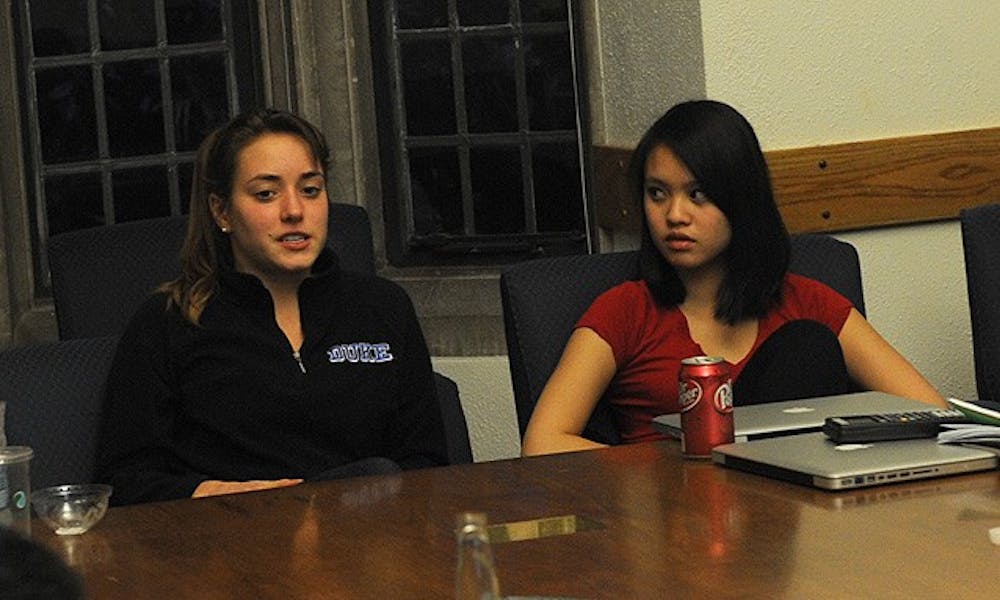Rick Johnson’s got “multimillion dollar problems” but a lack of enthusiasm is not one.
Newly hired Rick Johnson, assistant vice president for housing and dining, spoke to Campus Council at its meeting Thursday to discuss the University’s residential future and plans to improve both facilities and dining at Duke.
“We’re doing the same thing every university in the United States is doing,” Johnson said. “How do we make our residence halls more user-friendly and contemporary while at the same time maintaining the great historic exteriors?”
Johnson said Residential Life and Housing Services and the administration are going to focus on both short- and long-term changes within residential facilities, including beginning to get estimates for various projects like adding air-conditioning. He explained that RLHS will work more closely with the Facilities Management Department and the expertise of internal staff to try to put “priority to some of these projects.”
Johnson also noted that renovations will likely have to be done one at a time and gradually, unlike the major renovations to Kilgo and Few Quadrangles in 2002. Those renovations cost the University approximately $35-40 million, said Joe Gonzalez, associate dean for residence life.
“We’re going to work to do the [projects] we can and make a pretty good set of improvements that are significant,” Johnson said.
Gonzalez added that over the summer, all of the apartments between Anderson and Alexander streets on Central Campus will undergo internal renovations, including new carpeting, interior paint jobs and bathroom renovations.
Johnson said RLHS looked into renovating all of Central Campus, but after completing two test apartments, determined the cost of renovating each apartment to be roughly $70,000—a figure in excess of the approximate $10 million the University allocated for Central.
Johnson is the former director of housing and dining services at Virginia Tech and was hired by Duke in late 2010. Johnson assumed his position Jan. 31 and said he has noticed some similarities between Duke and Virginia Tech, noting that Virginia Tech converted to a residential college model in 2010.
“The house model—that’s pretty cool,” he said. ‘Even though the house model is not a residential college [system], it is similar in that it promotes equity, community and a multi-class structure.”
Johnson also addressed some potential concerns residential groups may have regarding the house model.
“There is a general feeling that there probably is going to be a group not happy with [the changes],” he said. “The hope is that the improvement will be so large it will compensate for the groups that may think they did not get the best deal out of it.”
In the long term, Johnson added that under the house model, he believes there is a lot of opportunity to connect residential life and dining, another way of promoting community. One of the projects on the horizon is the renovation of the West Campus Union and the Great Hall.
“In the near future, it’d be great if a house could get together and break bread,” he said. “People could come and go and know they will run into their friends.”
Campus Council President Stephen Temple, a senior, echoed the need for a residential and dining connection.
“A big piece will be the renovation to the West Union,” Temple said. “You go into the Great Hall now and see the plaques of all of the old houses we used to have. It would be nice if we could tap in to the residential dining component of Duke’s campus.
In other business:
Sophomore Cherry Tran, a member of the council’s policy committee, presented a recommendation to improve the party monitor training and procedure. The proposal includes improvements such as, a summary of material at the end of each day’s training and a test that party monitor candidates must pass, Tran explained. The proposal also requires living groups’ executive board members, such as the president, risk manager and social chair to participate in training. Under the new policy, e-mail reminders about training will be sent to participants and groups and their residence coordinators will have to exchange contact information. Party monitors will also have to register parties in person.
The recommendation passed with one abstention.
The council unanimously approved a set of recommendations to be submitted to Duke Student Government regarding the merger of Campus Council and DSG. DSG will be discussing the merger bylaw at its meeting next week, Temple said.
Get The Chronicle straight to your inbox
Signup for our weekly newsletter. Cancel at any time.

